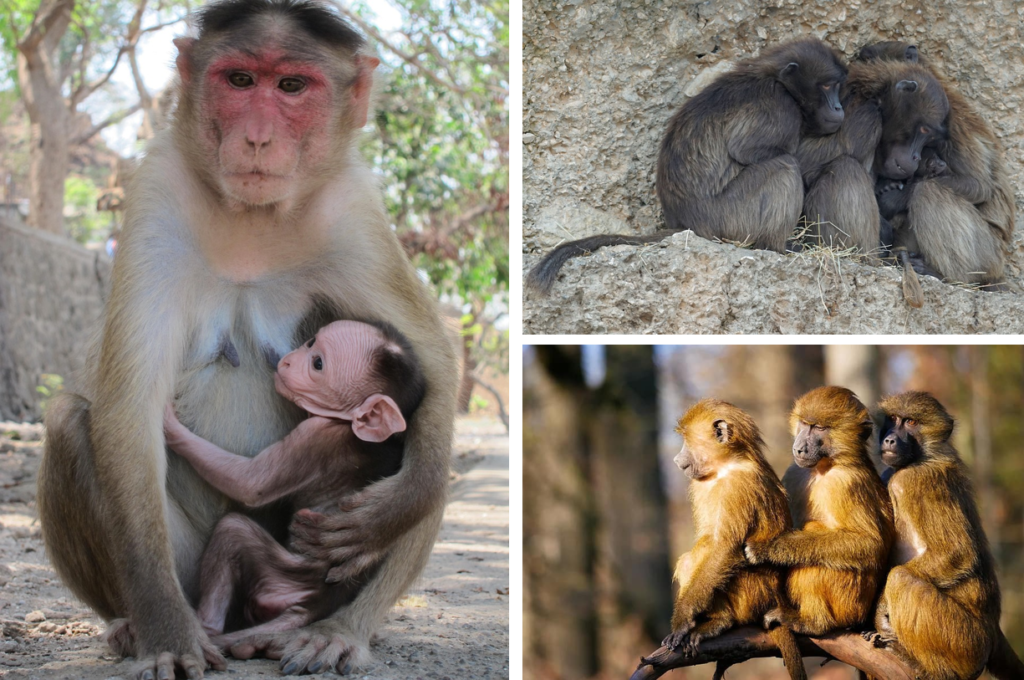Social distancing is hard – this is something we can all agree on. Why? Probably because being social is a key behavior of the primate lineage – which we are a part of. Primates live in social groups, forming strong relationships with other individuals in their groups throughout their lifetimes. Sociality is an adaptive behavior, or in other words, a behavior that aids survival and successful reproduction. For instance, when lions or orcas hunt in a group, they are more successful than when hunting individually, or, when females live together in a group, they provide increased protection and thus increased survival of their offspring. Because sociality is such a key part of all primates (and something we’re all craving right now), let’s take a closer look at the social structures and cultures of our fellow primates.
Primate groups have very specific social structures that vary considerably from species to species, including monogamous, polygynous, polygamous, and polyandrous groups. In any non-human primate group though, individuals with a better social status have better reproductive success, offspring survival, and longevity. In a one male-multifemale (polygynous) group, one male has mating access to all females. Polygyny is a mating practice observed in human cultures as well, such as in the Middle east, South Asia, and many sub-Saharan African tribes.
Other primate societies have multimale-multifemale groups, where every individual is ranked against other individuals of the same sex. In these types of groups, there is one alpha male and one alpha female. In some species, these high-ranking individuals will enforce ‘social contraception’ by intimidating the lower-ranking individuals out of breeding through aggression and harassment. The higher-ranked individuals in these societies will also hoard resources like food, making lower ranked individuals work harder to obtain sufficient nutrition. In these hierarchical societies, subordinate individuals display specific stress-induced psychological profiles, and they often have higher levels of stress-related hormones, like cortisol, in their blood. Prolonged stress also has impacts on cardiovascular function, reproductive success, and immune responses. These impacts of socially induced stress upon an individual’s health are consistent with the impacts observed on the health of humans from a lower socioeconomic status in westernized human societies. Because of this research, we know that for both human and non-human primates, a lack of social belonging is stressful, something that everyone social distancing can relate to.

Another similarity non-human primates have to humans is culture: culture is defined as a suite of behaviors transmitted from one generation to the next. Non-human primates pass on knowledge such as tool use, food choices, and communication. Young non-human primates learn how to use tools and hunt by copying older individuals in their group – this is known as social learning and exists in humans too! Learning allows primates to pass on valuable knowledge that increases success in finding food and surviving. In the case of humans, this social learning helps us learn to do everyday things like cooking, speaking, reading, and wearing masks to the grocery store- again, all things we need to do to survive and thrive.
Social isolation, like what many of us are experiencing in the time of COVID-19, is also difficult on non-human primates: in what are now considered classic behavioral experiments, young rhesus monkeys were removed from their mothers and placed in social isolation. The monkeys in isolation displayed disturbed behavior, such as staring into space and self-mutilation, and when they were reintroduced to their peers they did not know how to interact with them, often opting to remain separated from the others. Additionally, many of the monkeys that underwent isolation had shorter lives than the monkeys raised in groups. In humans, studies have found that people with close relationships to friends or family have greater longevity than those that live alone or isolated. Interestingly, the people in these studies who had strong social relationships were also healthier than those without strong social bonds: the social butterflies exercised more, had more success quitting unhealthy habits such as smoking, and maintained a healthier body weight.
Primate society, health and well-being revolves around their extreme sociality. By studying various aspects of non-human primate sociality, we gain more insight into how important sociality is for all animals of the primate lineage, highlighting how difficult this long period of social distancing has been. Because social interactions are so limited in this time, maintaining our social bonds with friends and family in whatever way we can is more important than ever, for both our mental and physical health.
Peer edited by Kasey Skinner